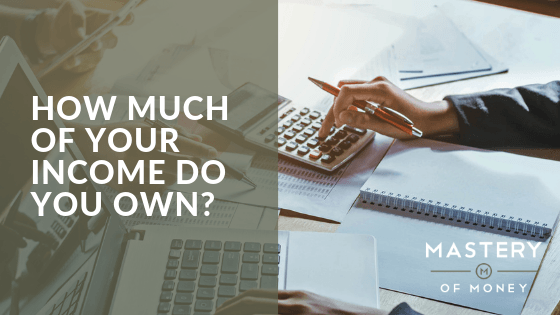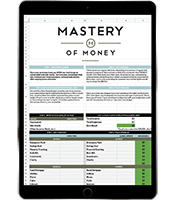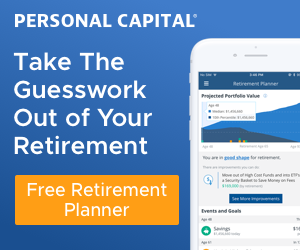I’ve been intrigued lately by the question: How much of your income do you own?
The most logical answer, it seems to me, would be “well, all of it, of course. It’s MY income”. In fact, I asked a handful of working adults that are part of an informal focus group of mine and nearly every one of them replied with that answer.
All but two.
One gentleman told me that he doesn’t feel like he owns any of his income because he rarely gets to see any of it. It automatically comes out of his paychecks to cover his mortgage, two healthy car payments, his credit card bills, kid’s college funds, monthly living expenses, and he’s often anticipating the next check days before it comes.
And a young lady in her twenties had a different take… “it’s God’s money. I’m just the steward of where it goes.”
Both I found to be fascinating answers. Both very open and honest. The first answer is what I’ll tackle in this article and leave the second for another time.
How much of your income does someone else own?
The mantra behind my podcast “Build a Bigger Life, Not a Bigger Lifestyle” came about when I was coaching a group of young professionals. They were asking me what I had done to set myself up for a lifetime of financial security, abundance, and ultimately freedom.
My answer came swiftly — “You have to build a bigger life, not a bigger lifestyle.”
I had witnessed too many people that, upon graduating from college, immediately set themselves on a course of buying a lifestyle that robbed them of their future income. Their income, month after month, was already spoken for before it came. Car payments, new clothes on a credit card, furniture that had been financed, the list went on and on.
In effect, the income that they were making was owned by someone else. They were just taking it on an installment basis, often charging excessive amounts of interest for the privilege of using the money in advance.
Enhancing the advice from The Richest Man in Babylon
In The Richest Man in Babylon by George S. Clason, I remember reading 10% of all you make is yours to keep. My naive brain, when reading this for the first time, thought, “no, all of what I make is mine to keep.” I was 16 or 17 at the time and every dime I made was pretty much mine. There were no other expenses in my life, after all. All I was really on the hook for was gas for my car at the time.
Fast forward to just after graduating from college. I had $8,000 in credit card debt, a student loan payment that kept coming due month after month, a heftier car payment than what I should have had, rent for an apartment, and a cell phone bill. By the time I paid all of these, I barely had enough for Totino’s party pizzas to get me through until payday. (And nothing woos the ladies like saying, “I can’t afford dinner out, but I’ve got a dozen Totino’s at home if you’d like to eat there?”)
I re-read The Richest Man in Babylon at that time and realized that 10% of my income was a stretch for me to keep. I was barely saving 2 or 3%. Most of the time I was probably in the negative — spending more than I made.
Over the coming years, something clicked and I realized that the way I was living — financing my every whim including food and beverage — was a ticket to living on next year’s income forever. I had to get control of my spending and my debt in order to own more of my income.
I started taking the advice from George S. Clason to heart. 10% of what I made went into a long-term index fund, and it slowly started gaining momentum.
As I began building a bigger life, reducing my monthly expenses by not eating out as much, sending more to my credit cards, requesting lower interest rates, and trading my car for a less expensive alternative, I wondered what would happen if I owned even more of my income. Could I enhance the advice of The Richest Man in Babylon and save more like 20%, 30% or more?
What happens when you own more of your income
The change didn’t happen overnight. In fact, it took about two years of doing things that most people won’t do.
- My wife and I didn’t eat out much, and when we did we shared an appetizer and an entree and drank water. Our $3 bottle of wine was waiting at home for us along with a $4 molten lava chocolate cake from Trader Joes. (We kind of had a routine…)
- I drove the car my wife’s parents had provided her as a teen until I was about 24. It was a big, heavy, 2 door, 5 speed Oldsmobile Cutlass Supreme. The thing drove like a dream and I felt like a race car driver with the 5 speed. And the two best things about it were: no car payment and low insurance.
- We bought our furniture from Craigslist and took hand me downs from family. Nothing was financed, only cash purchases.
And what started to happen was our accounts grew. Within 7 months we had an emergency fund that most people in their 50s don’t have. We were squirreling money into retirement accounts, blasting away student loans in $2,000 and $3,000 chunks. Because we owned more of our income, our income was going to HELP our future selves, not HINDER our future selves.
The biggest eye-opener for the both of us was the overall feeling we had in owning more of what we made. It felt like we had choices and options. We weren’t stuck in jobs — we did the jobs until we didn’t enjoy them any longer and then talked about what the next step should be. Never once worrying about how we’d cover the costs of life. We had that detail already planned.
But it was more than just choices and options. We felt free. We felt like there wasn’t a heavy cloud hanging over our head, worrying about the next bill. In fact, we were excited at the prospect of paying those bills off next month. There was literally an excitement about paying bills because with every one we paid, our financial freedom was drawing closer and closer.
Striving for 80-20 living
Today, our mantra is still “build a bigger life, not a bigger lifestyle”. We talk about making a lot, spending a little, and investing the rest for massive, passive, permanent streams of income. That income will soon supercede what our expenses are on a monthly basis. And when that happens, “working” for money becomes optional. It’s the financial freedom point.
My ultimate goal is to strive for 80-20 living. Where we can live on 20% of our income and give away, invest, or strategically use 80% for bigger life affirming projects. We’re nowhere near it, but I can see it on the horizon.




